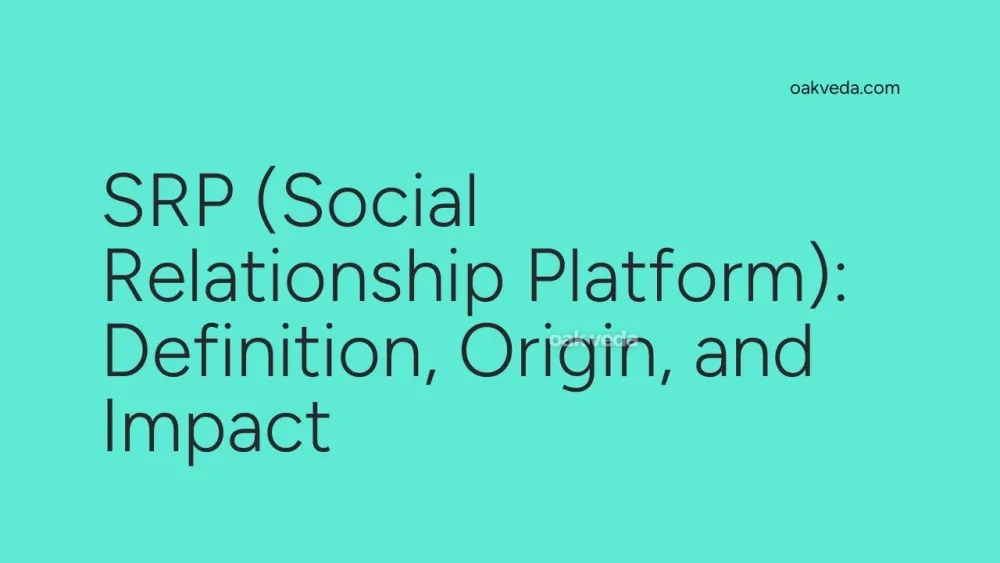
What is SRP?
SRP, which stands for Social Relationship Platform, is a comprehensive tool that has become indispensable in modern social media marketing. It refers to a centralized software solution that enables businesses to manage, monitor, and engage with their audience across multiple social media channels from a single interface. SRPs are designed to streamline social media operations, enhance brand consistency, and improve overall marketing efficiency.
Origin and Development of SRP
The concept of Social Relationship Platforms emerged in the early 2010s as social media began to dominate online communication. As businesses struggled to manage their growing presence across various social networks, the need for a unified management system became apparent. SRPs evolved from simple social media management tools to sophisticated platforms that offer a wide range of features, including content scheduling, analytics, and community engagement capabilities.
How SRP Works
Social Relationship Platforms operate by integrating with multiple social media APIs, allowing users to connect their various social accounts to a single dashboard. This integration enables marketers to:
- Schedule and publish content across different platforms simultaneously
- Monitor brand mentions and engage with followers in real-time
- Analyze performance metrics from all connected social channels
- Collaborate with team members on content creation and approval processes
- Manage customer service inquiries from social media in one place
By centralizing these functions, SRPs significantly reduce the time and effort required to maintain an effective social media presence.
Types of SRP Solutions
There are several types of SRP solutions available in the market:
- All-in-one platforms: Comprehensive solutions that offer a wide range of features for social media management, analytics, and engagement.
- Specialized tools: Platforms that focus on specific aspects of social media management, such as content scheduling or analytics.
- Enterprise-level SRPs: Robust solutions designed for large corporations with complex social media needs and multiple teams.
- SMB-focused platforms: More affordable and user-friendly options tailored for small to medium-sized businesses.
Popular Examples of SRP
Several well-known SRP solutions have gained popularity among marketers:
- Hootsuite: One of the pioneers in the SRP space, offering a wide range of features for social media management.
- Sprout Social: Known for its user-friendly interface and powerful analytics capabilities.
- Buffer: Popular for its intuitive content scheduling and publishing features.
- Later: An all-in-one platform specializing in visual content planning and scheduling, particularly for Instagram.
Impact of SRP on Social Media Culture
The adoption of Social Relationship Platforms has significantly impacted social media culture in several ways:
- Increased brand consistency: SRPs enable brands to maintain a cohesive voice and message across multiple platforms.
- Improved response times: Real-time monitoring features allow brands to engage with customers more quickly and effectively.
- Data-driven decision making: Comprehensive analytics provided by SRPs help marketers make more informed content and strategy decisions.
- Enhanced collaboration: Team features in SRPs promote better coordination among marketing team members.
How Brands and Influencers Use SRP
Brands and influencers leverage SRPs to maximize their social media impact:
- Content planning and scheduling: Creating content calendars and scheduling posts in advance to maintain a consistent presence.
- Cross-platform promotion: Easily adapting and sharing content across multiple social networks to reach a wider audience.
- Performance tracking: Monitoring key metrics to understand what content resonates best with their audience.
- Audience engagement: Managing comments, messages, and mentions from a centralized dashboard to improve response rates.
- Influencer collaboration: Some SRPs offer features to help brands identify and collaborate with influencers more effectively.
Future Trends Related to SRP
The future of Social Relationship Platforms is likely to be shaped by several emerging trends:
- AI-powered insights: Increased integration of artificial intelligence to provide more actionable insights and content recommendations.
- Advanced automation: More sophisticated automation features for content creation, curation, and engagement.
- Expanded channel support: Integration with emerging social platforms and messaging apps to keep pace with changing user preferences.
- Enhanced social commerce features: Greater focus on tools that facilitate direct sales through social media channels.
- Improved data privacy measures: Stronger emphasis on data protection and compliance with evolving privacy regulations.
FAQs about SRP
-
Is SRP suitable for small businesses? Yes, many SRP solutions offer plans tailored for small businesses with more limited features and lower costs.
-
Can SRP replace social media managers? While SRPs can significantly streamline social media management, they are tools that enhance rather than replace human expertise and creativity.
-
How does SRP differ from social media management tools? SRPs are more comprehensive, offering not just management features but also analytics, engagement, and often CRM capabilities.
-
Are SRPs difficult to learn and use? Most modern SRPs are designed with user-friendly interfaces, but the learning curve can vary depending on the complexity of the platform.
-
Can SRPs help improve ROI on social media marketing? By providing detailed analytics and streamlining processes, SRPs can help businesses optimize their social media strategies and potentially improve ROI.
In conclusion, Social Relationship Platforms have become essential tools in the modern social media marketer's arsenal. As social media continues to evolve, SRPs will likely adapt and expand their capabilities, remaining at the forefront of digital marketing technology. For businesses looking to enhance their social media presence and efficiency, investing in an SRP could be a game-changing decision.
You may be interested in:
- Demographics in Social Media: Definition, Origin, and Impact
- B2B in Social Media: Definition, Origin, and Impact
- Situationship: Definition, Origin, and Impact
- Banger: Definition, Origin, and Impact in Social Media
- Moots: Definition, Origin, and Impact on Social Media
- Content Calendar: Definition, Origin, and Impact on Social Media

